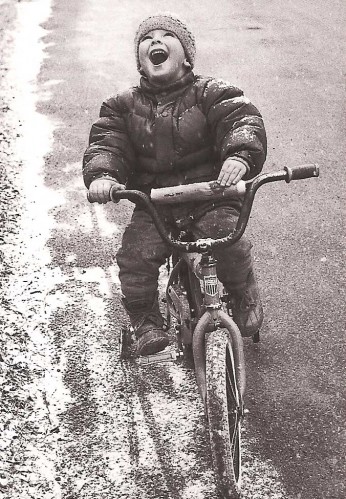Researchers say they know what makes you happy. Ask a total stranger. That’s the conclusion of a new study led by Harvard psychology professor Daniel Gilbert that says if people want to know how much they will enjoy an experience, they’re better off knowing how much someone else enjoyed it than knowing about the experience itself. So I am here to tell you, GO RIDE YOUR BIKE! It is super fun!
“Rather than closing our eyes and imagining the future, we should examine the experience of those who have been there,” says Gilbert explaining the upshot of the research findings.
Gilbert and colleagues studied how people make decisions based on predictions about how much pleasure, satisfaction, utility or reward those decisions will bring them. For example, they say, people make decisions about which home to buy, which person to marry, which medical treatment to accept, and so on by estimating the hedonic value each of these experiences will afford.
But, poor decisions often result from people’s difficulty predicting what they will enjoy and how much they will enjoy it. Often bad decisions come from a person imagining their reactions in a given circumstance and attempts to improve such decision making has generally has been unsuccessful.
So the researchers eliminated imagination from decision making in their experiments by asking people to predict how much they would enjoy a future event about which they knew absolutely nothing. Some subjects only were told how much a total stranger enjoyed the same event and made exceptionally accurate predictions.
In one experiment, for example, women predicted how much they would enjoy a “speed date” with a man. Some women learned nothing about the man, except how much another woman, whom they had never met, enjoyed dating him. Other women read the man’s personal profile and saw his photograph.
The women who learned about a previous woman’s experience did a much better job of predicting their own enjoyment of the speed date than those who studied the man’s profile and photograph. Interestingly, both groups mistakenly expected the profile and photo to lead to greater accuracy and held to that belief even after the experiment ended.
“People do not realize what a powerful source of information another person’s experience can be,” says Gilbert. “People believe that the best way to predict how happy they will be in the future is to know what their future holds, but what they should really want to know is how happy those who’ve been to the future actually turned out to be.”
See you can’t argue with science, go get your bike out of the garage and instead of using that gas hog to go to the library take your bike instead! It’s a lot of fun (trust me I am a total stranger) and you will have a great time!
